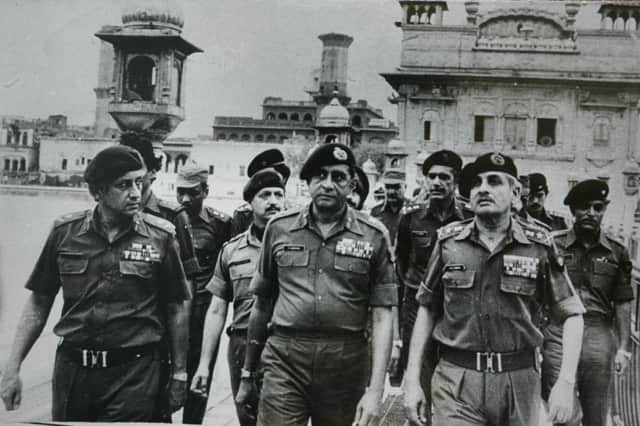Amritsar massacre: UK advice had ‘limited impact’


The investigation was ordered after documents released under the 30-year rule suggested that an SAS officer advised the Indians about how to deal with the Sikh dissidents occupying the site.
Foreign Secretary William Hague told the Commons that a British adviser travelled to India in February 1984, but his recommendation for a surprise assault using helicopters was not reflected in the raid which took place in June that year and resulted in extensive bloodshed.
Advertisement
Hide AdAdvertisement
Hide AdMr Hague said: “The Cabinet Secretary’s report finds that the nature of the UK’s assistance was purely advisory, limited and and provided to the Indian government at an early stage; that it had limited impact on the tragic events that unfolded at the temple three months later; that there was no link between the provision of this advice and defence sales and there is no record of the (British) government receiving advance notice of the operation.”
The investigation, by Cabinet Secretary Sir Jeremy Heywood found that Margaret Thatcher’s government agreed to a request from the Indian authorities to provide advice on the situation.
Mr Hague said: “(Sir Jeremy) has established that a single British adviser travelled to India between 8-17 February 1984 to advise the Indian intelligence services and special group on contingency plans that they were drawing up for operations against armed dissidents in the temple complex including ground reconnaissance of the site.
“The adviser’s assessment made clear that a military operation should only be put into effect as a last resort when all attempts at negotiation had failed.
“It recommended including in any operation an element of surprise and the use of helicopter-borne forces in the interest of reducing casualties and bringing about a swift resolution.”
In June that year the Indians launched Operation Blue Star, which resulted in 575 deaths according to official figures but Mr Hague said other reports suggested “as many as 3,000 people were killed including pilgrims caught in the crossfire”.
“This loss of life was an utter tragedy,” the Foreign Secretary said. “Understandably members of the Sikh community around the world still feel the pain and suffering caused by these events.”
Mr Hague said the Indian plan “changed significantly” between February and June 1984, with a considerably larger dissident force and extensive fortifications within the temple complex.
Advertisement
Hide AdAdvertisement
Hide AdAfter the UK adviser’s visit the Indian army took over responsibility for the operation, and the “main concept” behind it changed.
Sir Jeremy’s report contained an assessment by current military staff comparing Operation Blue Star with the approach recommended by the unnamed adviser.
Operation Blue Star was a ground assault, without the element of surprise or helicopter-borne troops.
“The Cabinet Secretary’s report therefore concludes that the UK military officer’s advice had limited impact on Operation Blue Star,” Mr Hague said.
Sir Jeremy’s investigation involved searching 200 files and 23,000 documents, Mr Hague said, but the Ministry of Defence’s papers on the advice given to the Indians had been destroyed in 2009.
But copies of some of the destroyed documents were contained in other departmental files and “taken together these files provide a consistent picture of what happened”.